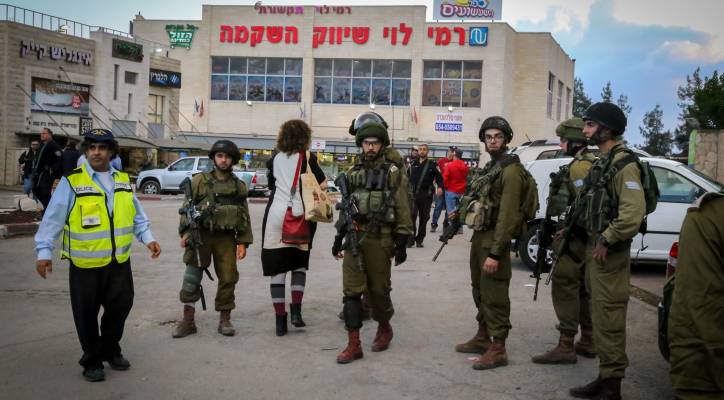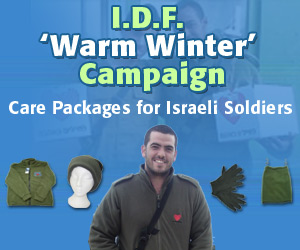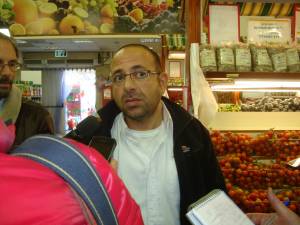
Eli Sharon, manager of the Gush Etzion branch of the Rami Levy supermarket chain, which employs an equal number of Jews and Arabs, says they are “keeping the coexistence.” (UWI)
Most people, according to ordinary Jews and Arabs in Gush Etzion, just want to live in peace. Several blame the Palestinian leadership for incitement to terror, which destroys families on both sides.
The Etzion Bloc (“Gush Etzion” in Hebrew), located in Judea between Jerusalem and Hebron and liberated during the 1967 Six Day War, now consists of 22 communities and more than 70,000 residents. A strategic area known as the southern gateway to Jerusalem, it is replete with biblical history.
Eli Sharon, manager of the local branch of the Rami Levy supermarket chain at the Gush Etzion junction, where a large percentage of terror attacks have been taking place, addressed a group of reporters on tour with Jerusalem-based MediaCentral.
The 120 employees are divided just about evenly between Jews and Arabs, and most live in the region, he said. There is no difference in salary or benefits based on ethnicity.
The store serves an average of 2,000 clients a day.
‘Everyone is Suffering’
“Everybody is very frustrated by the situation,” Sharon said, beginning with the kidnapping and murder of three teenage Israeli boys in the summer of 2014. “It’s not comfortable. Everyone is suffering.”
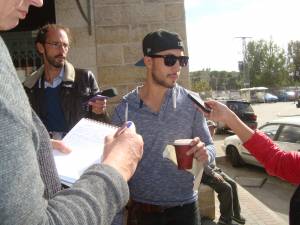
Josh Eidelshtein discusses the challenges facing local residents. (UWI)
He cited challenges regarding transportation, the extra security checks, and “at night, it’s even more complicated.”
The management forbids the staff from discussing politics, he added. “They should keep it [their opinions] to themselves. We don’t want to bring the conflict here.”
To date, since mid-September, 21 Israeli were killed by Palestinian terrorists who hail mostly from the Gush Etzion and Hebron region.
Before the current round in violence that began two months ago, the number of Jewish and Arab customers was also approximately equal. “Now, there are fewer Arabs. They’re afraid because there are a lot of soldiers. It’s uncomfortable.”
Indeed, the store was not particularly busy, but it appeared that there were no Arab shoppers that day.
Terror Attack ‘Could Happen Anywhere’
Sharon doesn’t feel particularly vulnerable in Gush Etzion. “It (a terror attack) could happen anywhere – Jerusalem, Tel Aviv, Ra’anana.”
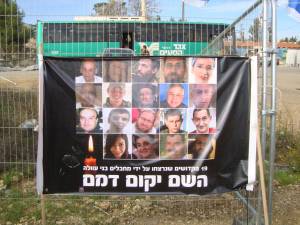
A poster showing the victims of Palestinian terror in Gush Etzion over the past two months. (UWI)
Despite the intensity of the conflict, “everybody here is still hoping for peace,” he said. “We are keeping the coexistence. The leadership is another issue. Everybody wants a normal life, to come to work, to take care of their children – except for the radicals. Unfortunately, they are ruining everything.”
Josh Eidelshtein, 28, a Toronto native and a resident of the community of Efrat, happened to be outside the store and shared his perspective on the situation. Asked by a foreign journalist what he would do if threatened by a terrorist, he replied that he would shoot immediately, in order to “neutralize the threat.”
One journalist asked if that’s not lethal, to which he replied: “You’re making a joke! It’s already lethal.”
‘We Want to Live in Peace’
“My personal opinion,” he continued, “is that if someone wants to murder, you have to kill him on the spot.” Otherwise, “he’ll go out and murder more people.”
“We want to live in peace with everyone…but at the end of the day, there’s so much [Palestinian] incitement,” he said, explaining that the current wave of terror began with false allegations about the Temple Mount and claims that Israel was trying to take over the Al-Aksa Mosque, which “wasn’t true.”
“A part of their culture is that they don’t want us here,” he said. “If gangs are acting violently and killing innocent people to get what they want, it doesn’t work.”
In response to a question about whether “both sides” do the same thing, he stressed that there is “no incitement” by the Israeli leadership “to go and murder innocent people.”
‘This Land Was Bought by Jews’
Asher Krimolovsky, a resident of Alon Shvut, was shopping at the supermarket when he encountered the group and offered his views.
“We very much want this area to be out of the conflict. We also know that many of the Arabs want us out of here, but this specific land was bought by Jews close to 100 years ago, and all this time they are killing us,” he said, referring to the tracts of land purchased by Jews in the 1920s and 1930s, where the core communities of Gush Etzion were built.
“We don’t want this situation,” he declared. “We would rather live peacefully with the Arabs and continue to do business with them.”
“It would benefit them as well,” Krimolovski said, noting that Israel is a democracy, in contrast to the surrounding countries, such as Syria, where the Islamic State and other terror groups persecute the people.
“I don’t understand it,” he said. “They could have a normal life,” if they would only stop the terror.
“This is our land,” he asserted. “If they want to live with us, we will let them live on our land in peace. They would prosper economically. But we want to be safe and not have to worry that they want to kill us. We want real peace.”
According to Krimolovski, many among the Arabs would prefer an end to the conflict, but the problem lies with their leadership.
Terror is ‘Bad’ for Palestinians
Odeh Elias, a Palestinian employee at Rami Levy, just wants to live in peace and build a better life for his children.
A 37-year-old father of three, he said the situation has become increasingly “uncomfortable” with all the soldiers in the area due to the ongoing terror. It used to take 15 minutes to get to work, he said, and now the trip is at least half an hour.
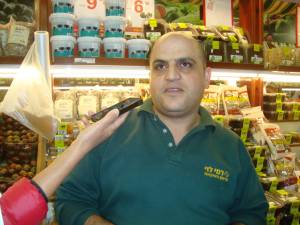
Odeh Elias, a Palestinian employee at Rami Levy, wants a better life for his children and an end to the conflict. (UWI)
“It’s bad for us,” he lamented. “We have to live together. It’s beneficial for both peoples. We need to earn a living for our families and build a good life for our children…
“What can we do? Just pray to God that we get peace…
“I grew up in a state of war, and I don’t want that for my children. It’s enough already,” he stated.
Asked if he fears losing his job due to the situation, he said: “Yes, we’re always thinking about that.” The management is reassuring, but “no one really knows what happens tomorrow. It takes just a minute for something to happen.”
An IDF soldier from the “Shiryon” unit on duty told United with Israel that he felt privileged to be stationed there. “It’s our land. We came here to help because of the situation,” he said.
By: Atara Beck, United with Israel
We are honored to thank the young men and women of the IDF who risk their lives every day to defend the citizens of Israel. Join us in sending winter care packages and personal notes of support to Israeli soldiers who are out in the cold all day. Warm up a soldier's heart with essential winter wear including fleece jackets. Keep an entire unit warm by ordering 10 packages... The soldiers truly appreciate your love and concern!Send 'Warm Winter' Care Packages to Israeli Soldiers - They are Cold!
